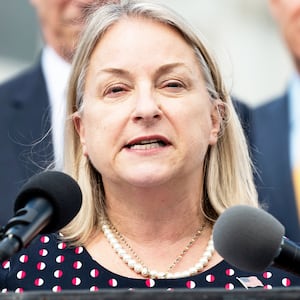Pay Dirt is a weekly foray into the pigpen of political funding. Subscribe here to get it in your inbox every Thursday.
Republican industrialist Lisa Scheller is vying to represent about 750,000 residents in Pennsylvania’s 7th Congressional District. But Scheller has interests in another region of about the same size—a half a world away.
That would be the island nation of Mauritius, a notorious international tax haven in the Indian Ocean—about 500 miles east of Madagascar—which has featured prominently in investigative reporting on the Panama Papers and Paradise Papers.
For more than two decades, Scheller has served as CEO of Tamaqua, Pennsylvania, manufacturing giant Silberline, a company her grandfather founded in 1945 and which, under Scheller’s leadership, grew into a global leader in the manufacturing of aluminum effect pigments—additives that lend paint a silvery shimmer.
Silberline has also lent Scheller a silvery shimmer.
According to her 2022 financial disclosure, Scheller values her stake in the company between $25 million and $50 million. And a decent chunk of that came from Silberline’s extensive overseas operations. That includes between $100,000 and $1 million apiece from the manufacturer’s operations in Mexico and Brazil, along with its two—now going on three—manufacturing plants in China, which have been the target of political attacks from her opponent, Rep. Susan Wild (D-PA).
But the disclosure also listed Scheller as executive director of another company—Silberline Mauritius Limited.
Not much is known about Silberline’s island outpost. The company’s website doesn’t mention any facilities or activity in Mauritius.
There’s absolutely no evidence of wrongdoing on the part of Silberline or Scheller. But in Silberline Mauritius Limited’s 17-year existence, there’s not much evidence of any doing. And that’s the core problem when it comes to understanding the company. (Neither Silberman, Scheller, nor her campaign offered insight in response to questions.)
Still, the available public information shows that Silberline Mauritius Limited has acted as a holding company for at least some of Silberline’s international business—most specifically in India and China.
Silberline’s overseas expansion has already been a liability for Scheller on the campaign trail. Pennsylvania’s 7th Congressional District, in the Lehigh Valley on the east side of the state, has manufacturing in its DNA. But that’s changed in recent decades, as companies looked overseas and industrial jobs began to dry up.
Scheller has taken shots for her role in the shift, as Silberline ramped up overseas operations while its U.S. employment ranks thinned. Democrats, including Wild, have seized on reporting about Silberline’s globalization practices and Scheller’s finances, though not all have done so accurately—one anti-Scheller super PAC yanked an ad after Scheller sent a cease-and-desist alleging false claims.
And Silberline Mauritius Limited appears to have been involved in Silberline’s global shift in two key markets, including China. And it is still active today, as the company continues to build out its Chinese presence.
According to Mauritius corporate records, Scheller created Silberline Mauritius Limited in 2005. And she did so with the help of an international tax expert from an overseas firm called Corporate & Chancery Chambers. He is listed as a director on the incorporation documents alongside Scheller.
Silberline Mauritius Limited shares its address with at least five companies that appeared in the notorious Panama Papers leaks, and at least one entity from the Paradise Papers leaks. Those massive document dumps helped investigative journalists shine a light on how some of the world’s wealthiest people have secretly moved their money and shielded it from tax collectors for almost 40 years.
Corporate & Chancery Group’s website says that this attorney specializes in corporate tax law—including “structuring holding companies for regional licensing, advising on offshore jurisdictions and transactions, international corporate tax planning with the use of offshore centres, structuring of aircraft leases, interpretation of and utilisation of tax treaties, use of profit jurisdictions and related re-invoicing techniques, migration of companies etc.”
The firm also does business in Hong Kong and the Seychelles, two other known offshore havens. It has no U.S. address.
But Mauritius is in some ways unique.
David Rosenbloom, international tax law specialist at Caplin & Drysdale and former director of the Treasury Department’s Office of International Tax Affairs, told The Daily Beast that the island has been most well-known as a tax haven for people and corporations doing business in India.
“Mauritius is sort of an Indian invention,” Rosenbloom said. “The reason people use Mauritius is that there was a tax treaty between India and Mauritius that’s very beneficial to Mauritius. It became very common to invest in India through Mauritius.”
Rosenbloom pointed to a landmark 2003 Indian Supreme Court ruling, where the justices effectively sided with a collection of Mauritius-based corporate interests, giving a pass to a tax treaty that was accused of facilitating tax evasion.
In short, that treaty allowed foreign corporate entities to avoid paying taxes in both the United States and India. Thanks to the loopholes, in the 1990s, U.S. dollars began to flow into India—with a layover in Mauritius.
Forgein companies in Mauritius can get a Global Business Licence—like Silberline Mauritius Limited’s—which qualifies them as an island “resident” for tax purposes. And thanks to the elimination of capital gains taxes, by 2013, nearly half of all direct foreign investment in India was going through companies located in Mauritius, the International Consortium of Investigative Journalists reported. The country of 1.2 million people has now signed tax treaties with at least 45 countries—though India renegotiated its treaty in 2016, reclaiming its right to levy capital gains taxes.
Such business structures—involving multiple entities across multiple countries operating under different and highly nuanced tax agreements—are exceedingly difficult even for experts to untangle. That’s often by design, though not always. Sometimes, it’s just good business.
But when it comes to opacity and complexity, Silberline Mauritius Limited is no exception. And it’s still unclear exactly what the company’s true purpose is, or what role Scheller plays in its operations.
The Daily Beast asked the Scheller campaign a number of detailed questions for this article. Those questions included how much money flows through Silberline Mauritius Limited, whether Silberline itself holds any of its profits offshore, what Scheller’s role is with the island subsidiary, and whether Scheller herself has a financial stake in Silberline Mauritius Limited or holds personal funds in that entity’s accounts.
We also asked whether Silberline benefits from international tax law under the arrangement, in a way that it would not if the Mauritius company were a U.S.-based entity beholden to American corporate tax requirements.
Scheller’s campaign manager Pierce Frauenheim did not address those questions. He did, however, attack Scheller’s opponent, implying that the information in this article came from her campaign, which it did not.
“Silberline Mauritius Limited holds no profits overseas and all US taxes are always paid,” Frauenheim wrote in a statement. “It is clear that Susan Wild knows she is losing this race, as she continues to attack Lisa’s success as a job creator to distract from her failing record of creating zero jobs and failing Pennsylvanians.”
The statement did not address foreign tax arrangements. It also did not address any dimension of Scheller’s relationship with Silberman Mauritius Limited.
The Daily Beast reached out to Silberline for this article, but the company does not readily provide a media contact and we did not receive a reply. We also asked Scheller about the Mauritius entity in her capacity as CEO and requested an appropriate corporate contact, but she did not respond.
According to filings with the Indian government, Silberline Mauritius Limited has done at least some business in that country. (Silberline itself lays claim to operations in Mumbai, via Silberline Specialty Effect Pigments India Private Limited.)
The Daily Beast was able to confirm two Indian government reports, showing that Silberline Mauritius Limited made at least two foreign direct investments in Silberline’s Mumbai subsidiary, in 2010 and 2015. But the amounts were paltry—100,000 Rupees in 2010, and two million Rupees in 2015; or about $2,000 and $31,000, respectively.
India’s renegotiated 2016 agreement with Mauritius makes foreign business arrangements less favorable. But Silberline Mauritius Limited has been active since then, and is still active today—even adding a new director just this year.
However, China also has a favorable tax treaty with Mauritius, though not as favorable as India’s original arrangement. And in 2020, the Organization for Cooperation and Economic Development’s annual report on the prevention of treaty abuse found China’s arrangement with Mauritius was not compliant with the minimum standard—a failing that applied to all of Mauritius’ treaties that year, and which the island claims it is making strides to remedy.
But then there’s Silberline Mauritius Limited’s second publicly ascertainable function.
According to a database of Chinese corporate records, the company also appears to be a shareholder of Silberline’s two Chinese facilities, as well as a shareholder of another of Silberman’s Chinese acquisitions, the now-defunct Yabo Color Technology.
In fact, corporate records with Mauritius show that just this January, after 17 years without any changes—and five years after India struck a harder bargain—Silberline Mauritius Limited added that third director: another attorney from the same overseas tax firm.
The previous month, a Silberline executive announced that the company would be opening its third plant in China.










